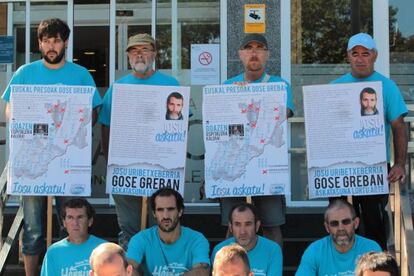Interior to decide whether to grant sick ETA inmate a release benefit
Basque radical left raises pressure on government to free convicted kidnapper

Penal officials are expected to decide Friday whether to raise the inmate benefit level for ETA terrorist Iosu Uribetxeberria Bolinaga, who has been on a hunger strike for nine days, to allow a court to decide whether he should be paroled, Interior Minister Jorge Fernández Díaz said Thursday.
Uribetxeberria, who is serving a 32-year sentence for the 1998 kidnapping of prison director José Antonio Ortega Lara, is terminally ill with cancer and his request for early release afforded to sick inmates has been repeatedly denied. The refusal has set off a series of widespread hunger strikes by some 100 ETA inmates being held in Spanish and French prisons.
Speaking on state broadcaster TVE, Fernández Díaz said that penitentiary officials will decide today whether to grant Uribetxeberria third-degree status, which is the first step for him to obtain parole. Yet the minister stressed that the “government was acting under the law” and was not being pressured by the ETA hunger strikers.
“This hasn’t moved us, nor will it move us to act,” he said.
It will be up to the High Court’s penal section to determine whether Uribetxeberria qualifies for parole. Judge Santiago Pedraz, the duty magistrate for the penal section, asked the Interior Ministry for its position after receiving a medical report from prison officials, which concludes that the ETA terrorist’s condition is “stable” but that his illness is “irreversible.” A medical examination was conducted by physicians at the Donostia Hospital in San Sebastián, who also informed the patient and his family about his health.
Pedraz had also asked Interior for Uribetxeberria’s last medical reports as well as its position on whether to give the inmate relief under Article 104.4 of the penitentiary regulations, which addresses prisoners with “incurable diseases.”
Prosecutors asked for a forensic report to determine whether Uribetxeberria’s cancer can be “adequately” controlled by the prison doctors, but ETA prisoners in similar conditions have previously been released.
“The diagnostic examination conducted today indicates that the clinical situation of the patient, who was admitted on August 1, is irreversible,” concludes the medical report. Medical sources say that beside his condition, which is “very serious,” in 50 percent of cancer cases such as Uribetxeberria’s, patients do not live more than six months. This prognosis was also passed on to prison officials.
Meanwhile, the Basque radical abertzale left has also upped the pressure on the Popular Party (PP) government. Herrira, the collective that supports the rights of ETA inmates, asked citizens to attend a street demonstration in Bilbao on Saturday in defense of Uribetxeberria’s release. Herrira said that the march is being held “so that there will never be another terrible case again.”
Laura Mintegi, the Euskal Herria Bildu candidate for Basque regional premier, also urged the government to release the convicted terrorist.
Tu suscripción se está usando en otro dispositivo
¿Quieres añadir otro usuario a tu suscripción?
Si continúas leyendo en este dispositivo, no se podrá leer en el otro.
FlechaTu suscripción se está usando en otro dispositivo y solo puedes acceder a EL PAÍS desde un dispositivo a la vez.
Si quieres compartir tu cuenta, cambia tu suscripción a la modalidad Premium, así podrás añadir otro usuario. Cada uno accederá con su propia cuenta de email, lo que os permitirá personalizar vuestra experiencia en EL PAÍS.
¿Tienes una suscripción de empresa? Accede aquí para contratar más cuentas.
En el caso de no saber quién está usando tu cuenta, te recomendamos cambiar tu contraseña aquí.
Si decides continuar compartiendo tu cuenta, este mensaje se mostrará en tu dispositivo y en el de la otra persona que está usando tu cuenta de forma indefinida, afectando a tu experiencia de lectura. Puedes consultar aquí los términos y condiciones de la suscripción digital.








































